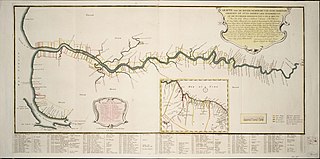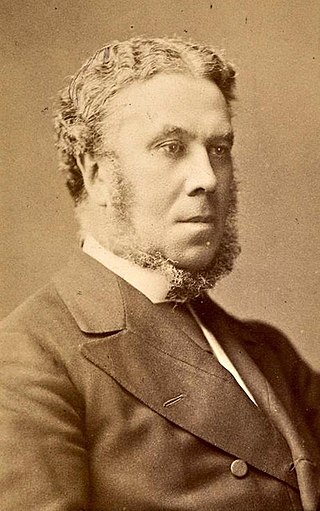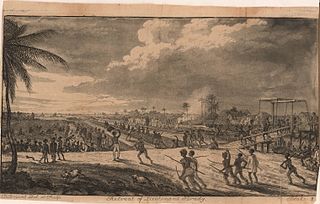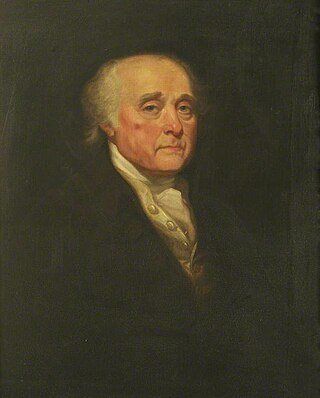Related Research Articles

Demerara is a historical region in the Guianas, on the north coast of South America, now part of the country of Guyana. It was a colony of the Dutch West India Company between 1745 and 1792 and a colony of the Dutch state from 1792 until 1815. It was merged with Essequibo in 1812 by the British who took control. It formally became a British colony in 1815 until Demerara-Essequibo was merged with Berbice to form the colony of British Guiana in 1831. In 1838, it became a county of British Guiana until 1958. In 1966, British Guiana gained independence as Guyana and in 1970 it became a republic as the Co-operative Republic of Guyana. It was located around the lower course of the Demerara River, and its main settlement was Georgetown.

Sir John Gladstone, 1st Baronet, was a Scottish merchant, slave owner, and Tory politician best known for being the father of British Prime Minister William Ewart Gladstone.
James Beckford Wildman was an English landowner and Tory politician who served as a Member of Parliament (MP) for Colchester from 1818 to 1826. His properties included plantations in Jamaica and Chilham Castle in Kent, England, which he sold in 1861. The Jamaican plantation, Quebec Estate, was obtained by the Wildman family from William Beckford. Beckford claimed to have been swindled by the Wildmans, who pressured him to sign over the property under threat of calling in outstanding mortgages.

Charles Rose Ellis, 1st Baron Seaford was a British politician, sugar planter, and slave holder.

The Rev. Joseph Ketley (1802-1875) was a mid-nineteenth century Congregational missionary and abolitionist in Guyana, the former British colony of British Guiana which was known as Demerara and Essequibo at the time when his mission was established. The Dutch colonies of Berbice‚ Demerara and Essequibo were ceded to the British in 1814‚ and incorporated into a single colony in 1831. Guyana became independent in 1966.
Christopher Bethell-Codrington was a British politician, planter and amateur cricket player who served as a MP in the British Parliament.

Peter McLagan was a British Liberal Party politician who sat in the House of Commons from 1865 to 1893. He was Scotland's first non-White and first Black MP.
Francis Baring, 3rd Baron Ashburton was a British peer Whig and later Tory politician.
Jack Gladstone was an enslaved Guianese man who led the Demerara rebellion of 1823, one of the large slave rebellions in the British Empire. He was captured and tried after the rebellion, and deported.

The Demerara rebellion of 1823 was an uprising involving between 9,000 and 12,000 enslaved people that took place in the colony of Demerara-Essequibo (Guyana). The exact number of how many took part in the uprising is a matter of debate. The rebellion, which began on 18 August 1823 and lasted for two days. Their goal was full emancipation. The uprising was triggered by a widespread but mistaken belief that Parliament had passed a law that abolished slavery and that this was being withheld by the colonial rulers. Instigated chiefly by Jack Gladstone, an enslaved man from the "Success" plantation, the rebellion also involved his father, Quamina, and other senior members of their church group. Its English pastor, John Smith, was implicated.

Quamina Gladstone, most often referred to simply as Quamina, was a Guyanese slave from Africa and father of Jack Gladstone. He and his son were involved in the Demerara rebellion of 1823, one of the largest slave revolts in the British colonies before slavery was abolished.
John Mitchell was an English Tory politician.

Sir William Dolben, 3rd Baronet was an English Tory politician and abolitionist.
James Blair was a Ulster-Scots owner of plantations in the West Indies. He entered Parliament as a Tory in 1818 to protect the interests of slave-owners. Blair sat in the House of Commons from 1818 to 1830, and later from 1837 to 1841.
Colonel Thomas Moody was a British geopolitical expert to the British Colonial Office; Commander of the Royal Engineers in the West Indies; Director of the British Royal Gunpowder Manufactory; Inspector of Gunpowder; and Director of the New Brunswick and Nova Scotia Land Company.
William James was an English Radical politician. A Liverpool-born slave-owner, he sat in the House of Commons as a Member of Parliament (MP) for constituencies in Cumberland for twenty years over the three decades from 1820.
Sandbach, Tinne & Company, together with its associate firms McInroy, Parker & Company and McInroy, Sandbach & Company, was a business whose roots can be traced back to 1782. Having begun business in the cotton trade, the firms moved into sugar products and exported coffee, molasses, rum and sugar from the West Indies. They owned ships and plantations, and engaged in both slavery and transport of indentured labour.

Plantation Peter's Hall was a plantation on the east bank of the River Demerara in Dutch Guiana and British Guiana. It was probably laid out in the mid-eighteenth century and by the early nineteenth century had over 200 slaves before that institution was abolished in the British Empire.
Dorothy Thomas was a Caribbean entrepreneur and former slave who engaged in business in Montserrat, Dominica, Grenada, Barbados, and Demerara. Having purchased her own manumission, Thomas spent nearly sixteen years securing the freedom of her children, mother, and several other relatives. Though she owned hotels one of which had a French restaurant, her primary source of income was hiring out female hucksters to whom she supplied goods to be sold to plantation workers and slaves. She also hired out her slaves as labourers, earned income from lodging houses, ran a plantation, and rented out properties which she owned. Known as one of the few black women who derived compensation from the government scheme to reimburse slave owners, she received £3,413 for the loss of her labourers when Britain abolished slavery.
George Rainy was a Scottish merchant, slave owner and land owner. In the early 1800s, Rainy became involved in sugar plantations in the Caribbean which were worked by African slaves in Demerara in Guiana. Due to extensive family connections he eventually became a full partner in Sandbach, Tinne & Company, a Scottish-run company which dealt in trade in the same field and was prominent in British Guiana, to the extent that the men who ran it were called the "Rothschilds of Demerara" on account of their wealth and influence. After the abolition of the Atlantic slave trade in the British Empire in the 1830s, Rainy became involved in the Highland Clearances. Using monies from the payout to former slave-owners following the Slavery Abolition Act 1833, he purchased the islands of Raasay, Rona and Fladda from Clan MacLeod in 1846: he removed from the land twelve townships of ninety-four Gaelic Highlander families to make way for sheep farming, causing mass depopulation and displacement on the islands.
References
- ↑ Rayment, Leigh (28 August 2018). "The House of Commons: Constituencies beginning with "L"". Leigh Rayment's Peerage Page. Archived from the original on 3 December 2011. Retrieved 24 November 2018.
{{cite web}}: CS1 maint: unfit URL (link) - 1 2 3 4 5 6 7 McClelland, Keith (6 October 2016). "Stewart, John (1789–1860)" . Oxford Dictionary of National Biography (online ed.). Oxford University Press. doi:10.1093/ref:odnb/109523.(Subscription or UK public library membership required.)
- ↑ Craig, F. W. S., ed. (1977). British Parliamentary Election Results 1832-1885 (1st ed.). London: Macmillan Press. p. 196. ISBN 978-1-349-02349-3.
- ↑ Stooks Smith, Henry. (1973) [1844-1850]. Craig, F. W. S. (ed.). The Parliaments of England (2nd ed.). Chichester: Parliamentary Research Services. pp. 127–129. ISBN 0-900178-13-2.